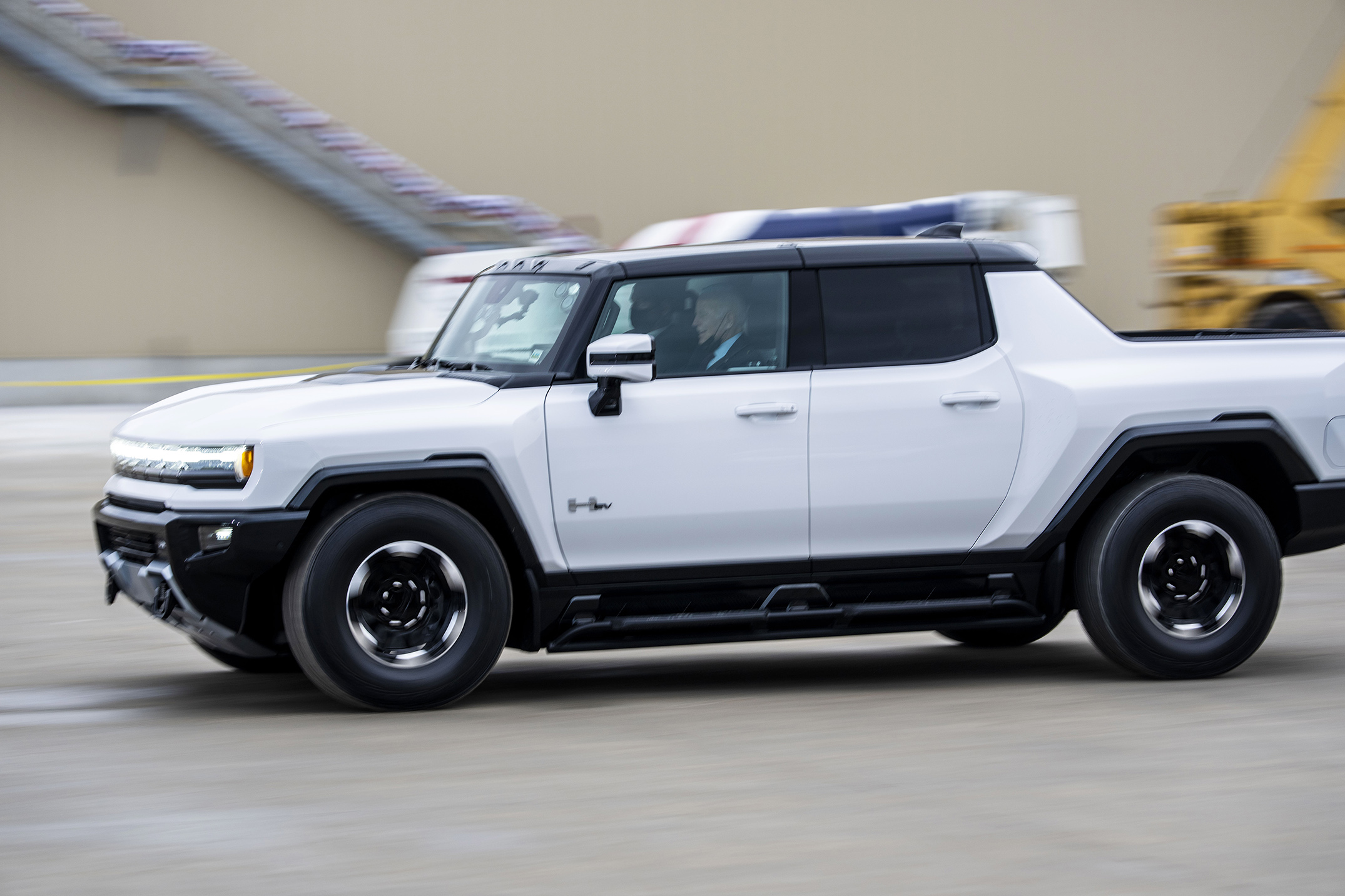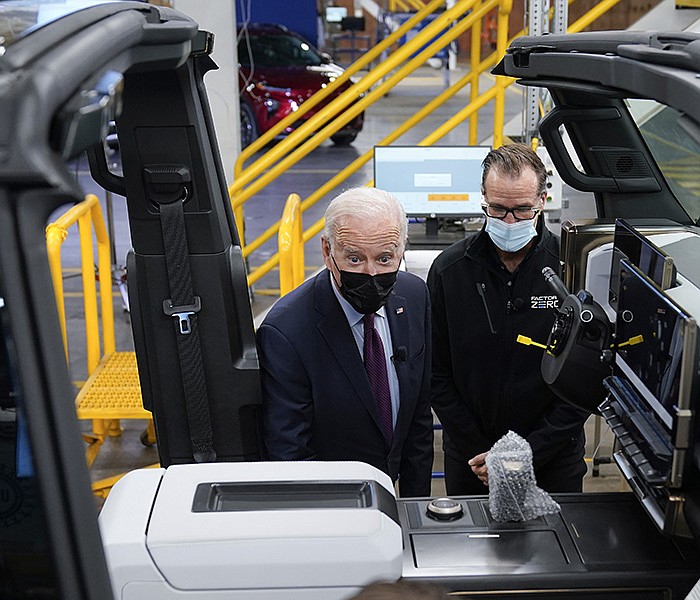President Joe Biden traveled Wednesday to Detroit to promote American-made electric vehicles and a new infrastructure package at a time when the rest of his climate agenda hangs in the balance back in Washington.
Biden attended the grand opening of a General Motors plant reconfigured to build electric trucks and SUVs. The trip comes as part of a broad effort to promote a just-signed $1.2 trillion measure that dedicates $7.5 billion to constructing a nationwide network of charging stations.
But it comes as lawmakers are debating how much money to include for Biden's climate initiatives, including tax breaks for electric vehicles, as part of a separate $2 trillion budget bill.
The administration is also scrambling to finalize new rules tightening tailpipe emissions for newly built cars, SUVs and pickups that are meant to bolster sales of battery-powered vehicles. The work must be done before the end of the year for the administration to have any hope of reaching its goal of having electric or plug-in hybrid vehicles make up half of new car sales by 2030.
Biden's tour comes just days after a two-week climate conference in Glasgow, Scotland, that reached an agreement that even organizers acknowledged doesn't go nearly far enough in cutting carbon emissions. Nations agreed to try to tighten near-term targets but failed to chart a path that would keep the planet from warming by 2.7 degrees Fahrenheit above preindustrial temperatures.
Boosting the manufacture and sale of cleaner cars in the United States now represents one of the last chances for Biden and other Democrats to notch a win in their fight against global warming before year's end.
"Since he can't do very much at the moment on power plants and -- not to put too fine a point on it -- Glasgow fizzled, issuing strong car rules would be the single biggest step by any nation to address global warming," said Dan Becker, director of the Center for Biological Diversity's Safe Climate Transport Campaign.
Biden is hoping to do even more to promote electric vehicles, including backing a provision for a $7,500 tax credit for consumers who buy electric vehicles through 2026, which has been floated as part of his proposed $1.85 trillion social services and climate bill.
The following year, only purchases of electric vehicles made in the U.S. would qualify for the credit. The base credit would go up by $4,500 if the vehicle is made at a U.S. plant that operates under a union-negotiated collective bargaining agreement. Only auto plants owned by GM, Ford Motor Co. and Stellantis NV qualify.
To overcome Republican opposition, Democrats are using a budget procedure that requires the support of every member of their caucus.
MANCHIN UNDECIDED
The most crucial remaining undecided vote lies with Sen. Joe Manchin, who represents the gas- and coal-producing state of West Virginia. The conservative Democrat has repeatedly objected to the electric vehicle tax credit's size and scope.
Under Democrats' original proposal, Americans could claim the full credit if they make less than $400,000 a year individually or $800,000 as a couple. But in negotiations, Manchin argued that those income thresholds were too generous to wealthier Americans.
House Democrats settled on an income cap somewhere in the middle: $250,000 for individuals and $500,000 for couples. Lowering the thresholds would funnel aid to Americans more in need of them but might lower overall electric cars sales as a result.
Manchin has further alienated some Democrats by questioning part of the tax credit that allowed a $4,500 rebate for union-made electric vehicles. Speaking at a Toyota plant in West Virginia, he called the extra incentive for electric cars rolling off the line of union-organized factories "wrong" and "not American."
Senate Republican leader Mitch McConnell took the Senate floor Tuesday to make the case that "the Biden administration doesn't have any strategic plan to snap its fingers and turn our massive country into some green utopia overnight."
"They just want to throw boatloads of government money at things like solar panels and electric vehicles and hope it all works out," said McConnell, one of 19 GOP senators who voted in favor of the infrastructure bill. He added, "American families are staring down the barrel of skyrocketing heating bills, and the Democrats' response is to go to war against affordable American energy."
The labor-friendly tax credit would help the traditional "Big Three" U.S. automakers with factories represented by the United Auto Workers -- GM, Ford Motor Co. and Stellantis, the parent company of Chrysler -- but non-union auto companies such as Toyota oppose it.
"Let's not play politics with the environment," the Japanese automaker announced in a newspaper ad this month.
The president noted that the U.S. was not yet leading with electric vehicles, something he believes his infrastructure package can change with plans to build 500,000 charging stations. The Hummer he drove has a starting price of $108,700, as the electric market seems designed so far to serve luxury buyers instead of a mass audience.
"Up until now, China has been leading in this race -- that's about to change," he said. "We're going to make sure that the jobs of the future end up here in Michigan, not halfway around the world."
Two top White House advisers, writing in the Detroit Free Press, said the legislation will help America regain its global competitiveness, which has waned, they contend, "after decades of delay and decay."
"Nobody knows this better than Detroit, which has been at the heart of American industrial strategy in the past and now can again, which is why President Biden is coming today," wrote Brian Deese, director of the National Economic Council, and national security adviser Jake Sullivan in an opinion column published Wednesday.
Sen. Debbie Stabenow of Michigan, a champion of the union-friendly tax break, said in an interview Tuesday that she was "disappointed" with Manchin's opposition but was "particularly astounded at the way Toyota has been acting in all of this" given that its Japanese factories are unionized.
"They do everything they can to stop our American companies from being able to sell in Japan," added Stabenow, who is joining Biden in Detroit. "We don't do that to them."
The GM assembly plant hosting the president opened in 1985 and straddles the cities of Detroit and Hamtramck. The company retooled the facility to make electric versions of its Hummer and Silverado lines.
CHARGING NETWORK
The plant won't see much direct impact from the infrastructure spending, but it will benefit from $7.5 billion designated to help build an electric vehicle charging network.
Biden wanted $15 billion to build 500,000 chargers and hasn't given a number for how many could be constructed for half that amount.
It's seek as likely that $7.5 billion won't be enough. The International Council on Clean Transportation says the U.S. will need 2.4 million charging stations by 2030 if 36% of new vehicle sales are electric.
Currently, there are about 45,500 charging stations nationwide with about 112,000 plugs.
Democrats hope the tax credits would work in tandem with a pair of proposed regulations designed to reduce greenhouse gas emissions and improve the fuel efficiency of new cars, SUVs and pickups built over the next four years.
But the Environmental Protection Agency and Transportation Department need to complete the rules before Dec. 31 so carmakers can comply with the requirements for the next model year.
While the tax credit is getting watered down in Congress, administration officials are preparing to finalize more stringent standards than what they first proposed in August. "What we finalize will be much more aggressive and much more comprehensive," EPA Administrator Michael Regan told Bloomberg News in Glasgow.
The EPA plans to strengthen emissions standards for new cars built during the later years of the program, which runs through model year 2026, according to an individual briefed on rulemaking but not authorized to speak publicly about it.
A spokesman for the EPA, which sent the car rule to the White House for review last week, declined to elaborate on the agency's plans.
Clean car advocates said they are heartened to see the agency take a more aggressive approach, especially after the Trump administration froze requirements to improve the fuel efficiency of gasoline-powered engines. The delay makes it difficult for the current administration to make up for those years.
"It's just a fact, a reality, that we lost a couple of years because of the Trump rollback," said Jeff Alson, a former engineer at the EPA's vehicles lab in Ann Arbor, Mich.
Other climate provisions in the budget reconciliation package beyond the electric car incentives remain in peril.
A trio of House Democrats representing Texas oil country, for instance, oppose placing a fee on excess methane emissions from leaky wells and pipelines, arguing that a forthcoming EPA regulation should do enough to curb the potent greenhouse gas without Congress having to intervene.
"We think that the EPA rules can take care of the issues," said Rep. Henry Cuellar, who outlined his concerns with the methane fee, along with Reps. Vicente Gonzalez and Filemon Vela, in a letter sent earlier this month to House Speaker Nancy Pelosi, D-Calif.
Despite the uncertainty of what can pass, Pelosi and other House Democratic leaders are planning a vote on the climate and social safety net package as soon as this week. Many of the most ardent climate hawks in Congress are losing patience with Manchin and other Democratic moderates.
"It's time to vote," said Rep. Kathy Castor, D-Fla., chairwoman of the House Select Committee on Climate Crisis. "We've been negotiating, President Biden's been negotiating for many months now."
Information for this article was contributed by Dino Grandoni and Seung Min Kim of The Washington Post; and by Aamer Madhani, Tom Krisher and Alexandra Jaffe of The Associated Press.
 President Joe Biden test drives an electric Hummer on Wednesday at General Motors’ electric vehicle assembly plant in Detroit. Biden’s visit to the plant is part of his effort to promote the $1.2 trillion infrastructure initiative that dedicates $7.5 billion to constructing a nationwide network of charging stations for electric vehicles. (The New York Times/Doug Mills)
President Joe Biden test drives an electric Hummer on Wednesday at General Motors’ electric vehicle assembly plant in Detroit. Biden’s visit to the plant is part of his effort to promote the $1.2 trillion infrastructure initiative that dedicates $7.5 billion to constructing a nationwide network of charging stations for electric vehicles. (The New York Times/Doug Mills)DOUG MILLS
Gallery: President Biden visits Detroit

